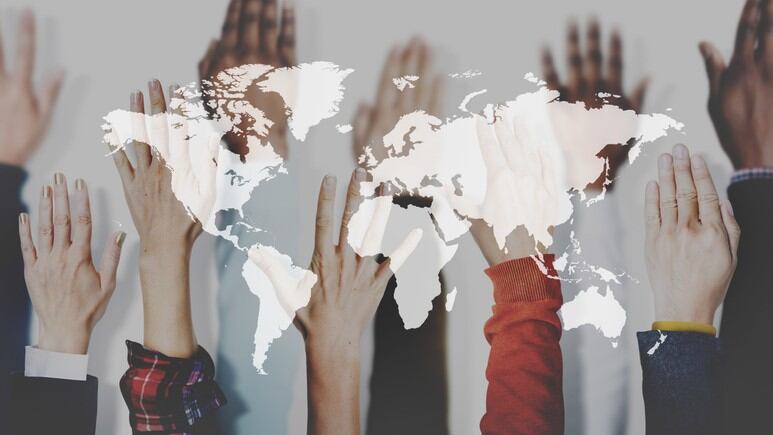The commitment was unveiled today as part of a wider corporate announcement that Unilever would drive diversity, upskill and raise living standards amongst its global workforce and supplier networks over the next decade.
“The two biggest threats that the world currently faces are climate change and social inequality,” said Alan Jope, CEO of Unielver.
“The past year has undoubtedly widened the social divide, and decisive and collective action is needed to build a society that helps improve livelihoods, embraces diversity, nurtures talent, and offers opportunities for everyone,” Jope said.
Working with SME suppliers led by ‘under-represented groups’
Unilever said that by 2025 it wanted to be spending €2bn annually with “diverse suppliers”; up from its current annual spend of €350m with these businesses. Unilever's total global supplier spend each year sat at €35bn.
So, what was the profile of these diverse suppliers?
“These suppliers will be small and medium-sized businesses owned and managed by women, under-represented racial and ethnic groups, people with disabilities and LGBTQI+."
The personal care major said that, in addition to raising its annual spend with diverse suppliers, it would also work with these businesses under a new Supplier Development Programme to provide access to skills, financing and network opportunities.
“We will promote supplier diversity throughout our value chain, encouraging our suppliers to have diversity amongst their respective partners,” Unilever said.
Internally, the personal care major would also remove “barriers and bias” when recruiting its own workforce and establish leadership accountability to support all employees via a new Equity, Diversity and Inclusion strategy – driving efforts beyond what had already been achieved, notably gender balance across its global management.
The company said the goal was to “achieve a workforce that is representative of the population in the countries where we operate”.
The corporate interest? Diversity in the workplace directly resulted in improved financial performance through its capacity to “foster innovation, creativity and empathy”, according to Unilever.
Upskilling Unilever’s workforce and wider supply network
In parallel to supporting SMEs led by under-represented groups, Unilever said it would also commit to helping five million SMEs within its retail value chain grow business through access to skills, finance and technology by 2025.
“The SMEs we work with are often retailers who run independent stores, outlets and kiosks, or micro-entrepreneurs making sales in the streets or house-to-house. We will provide them with access to digital tools, financial inclusion and services, and public-private models that support social entrepreneurship, to help them grow their business and their income.”
Unilever would also help equip ten million young people with “essential skills to prepare them for job opportunities” by 2030 via work experience placements and collaboration with youth enterprises, and also invest in the upskilling or reskilling its own internal workforce, aiming for everyone to have a “future-fit skillset” by 2025.
Living wages to build a more ‘equitable and inclusive’ society
Beyond this, Unilever said it would ensure everyone who “directly provides goods and services” to the company earned at least a living wage or income by 2030.
“We already pay our employees at lease a living wage, and we want to secure the same for more people beyond our workforce, specifically focusing on the most vulnerable workers in manufacturing or agriculture. We will work with our suppliers, other businesses, governments and NGOs – through purchasing practices, collaboration and advocacy – to create systemic change and global adoption of living wage practices.”
Ensuring people earned a living wage, Unilever said, was a “critical step towards building a more equitable and inclusive society”; allowing people to afford a decent standard of living, cover basic family needs and offer provisions for unexpected events.
“In addition, when people earn a living wage or income, there is a direct benefit to the economy, as it stimulates consumer spending, aids job creation, helps small businesses, decreases employee turnover and improves job productivity and quality – overall creating a virtuous cycle of economic growth.”
‘Responsible action’ from private sector to create change
Gabriela Bucher, executive director of Oxfam International, said: “Unilever’s plan shows the kind of responsible action needed from the private sector that can have a great impact on tackling inequality, and help to build a world in which everyone has the power to thrive, not just survive.”
Bucher said Oxfam would work alongside the personal care major to help it “deliver for under-represented groups, to accelerate their systemic changes and to shift industry practice and laws”.
Jope added: “We believe the actions we are committing to will make Unilever a better, stronger business; ready for the huge societal changes we are experiencing today – changes that will only accelerate.”
Last year, Natura & Co and L’Oréal were ranked the most ‘inclusive and diverse’ beauty majors in the world, according to the annual Diversity & Inclusion Index report from financial market insights firm Refinitiv. Natura & Co ranked second in the top 100 global list and L’Oréal sixth; Unilever ranked 64th in the report.
Refinitiv said the ongoing COVID-19 pandemic had truly “shone a light on why diversity is critical for business recovery and resilience”, noting that diversity and inclusion had to be on the post-COVID agenda alongside financial resilience, environmental risks and workforce health for any company moving forward.



